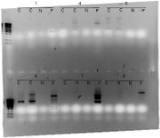RAPD stands for
random amplification of polymorphic DNA. It is a type of PCR reaction, but the segments of DNA that are amplified are random. The scientist performing RAPD creates several arbitrary, short primers (8–12 nucleotides), then proceeds with the PCR using a large template of genomic DNA, hoping that fragments will amplify. By resolving the resulting patterns, a semi-unique profile can be gleaned from a RAPD reaction.
No knowledge of the DNA sequence for the targeted gene is required, as the primers will bind somewhere in the sequence, but it is not certain exactly where.


